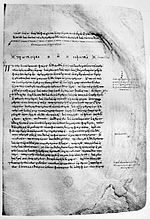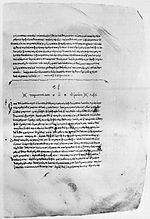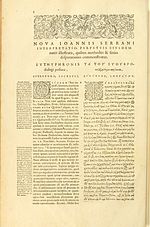Gorgias (/ˈɡɔːrɡiəs/; Greek: Γοργίας [ɡorɡíaːs]) is a Socratic dialogue written by Plato around 380 BC. The dialogue depicts a conversation between Socrates...
21 KB (3,158 words) - 08:55, 23 October 2024
ragionamento di Gorgia (Italian) Archived 2018-04-30 at the Wayback Machine A theory referring to the theory of Gorgias Works by or about Gorgias at the Internet...
38 KB (5,018 words) - 07:16, 29 October 2024
Gorgias was a Greek sophist, pre-socratic philosopher and rhetorician. Gorgias may also refer to: Gorgias (dialogue), an important Socratic dialogue Gorgias...
636 bytes (103 words) - 03:48, 21 August 2022
Plato's Gorgias dialogue. The dialogue references the Trial of Socrates, which takes place in 399 BCE and is set right. At the end of the dialogue, as Socrates...
30 KB (4,229 words) - 01:15, 23 October 2024
Callicles (section Callicles in Plato’s Gorgias)
Athenian political philosopher. He figures prominently in Plato’s dialogue Gorgias, where he "presents himself as a no-holds-barred, bare-knuckled, clear-headed...
6 KB (669 words) - 17:39, 22 October 2024
Socratic dialogue (Ancient Greek: Σωκρατικὸς λόγος) is a genre of literary prose developed in Greece at the turn of the fourth century BC. The earliest...
14 KB (1,623 words) - 18:41, 28 October 2024
translit. Phaidros), written by Plato, is a dialogue between Socrates and Phaedrus, an interlocutor in several dialogues. The Phaedrus was presumably composed...
44 KB (6,319 words) - 11:07, 11 October 2024
Dialectic (redirect from Collective dialogue)
meaningful. In another example, in Plato's Gorgias, dialectic occurs between Socrates, the Sophist Gorgias, and two men, Polus and Callicles. Because...
38 KB (4,924 words) - 18:42, 4 November 2024
Τίμαιος, translit. Timaios, pronounced [tǐːmai̯os]) is one of Plato's dialogues, mostly in the form of long monologues given by Critias and Timaeus, written...
26 KB (3,440 words) - 09:43, 10 October 2024
Protagoras (/proʊˈtæɡərəs/; ‹See Tfd›Greek: Πρωταγόρας) is a dialogue by Plato. The traditional subtitle (which may or may not be Plato's) is "or the Sophists"...
19 KB (2,841 words) - 10:38, 5 September 2024
Dialogus de oratoribus (redirect from Dialogue on Oratory)
The Dialogus de oratoribus is a short work attributed to Tacitus, in dialogue form, on the art of rhetoric. Its date of composition is unknown, though...
4 KB (554 words) - 16:45, 30 June 2024
Plato (redirect from Dialogues of Plato)
Virtue: Beauty, Truth and Goodness Nine Dialogues by Plato: Pheadrus, Lysis, Protagoras, Charmides, Parmenides, Gorgias, Theaetetus, Meno & Sophist. Authorhouse...
95 KB (9,829 words) - 19:37, 21 November 2024
Apology (Plato) (redirect from Apology (dialogue))
Sokrátous; Latin: Apologia Socratis), written by Plato, is a Socratic dialogue of the speech of legal self-defence which Socrates (469–399 BC) spoke at...
34 KB (4,508 words) - 08:46, 25 October 2024
Παρμενίδης) is one of the dialogues of Plato. It is widely considered to be one of the most challenging and enigmatic of Plato's dialogues. The Parmenides purports...
30 KB (4,443 words) - 22:07, 22 October 2024
possession. It is one of the shortest of Plato's dialogues. Socrates, the Greek philosopher. In this dialogue, he questions the nature of art and of divine...
9 KB (1,266 words) - 04:37, 6 October 2024
The Menexenus (/məˈnɛksənəs/; Greek: Μενέξενος) is a Socratic dialogue of Plato, traditionally included in the seventh tetralogy along with the Greater...
9 KB (1,048 words) - 23:51, 22 October 2024
Phaedo (redirect from Phaedo (dialogue))
the best-known dialogues of Plato's middle period, along with the Republic and the Symposium. The philosophical subject of the dialogue is the immortality...
31 KB (4,590 words) - 16:03, 1 November 2024
name of a dialogue by Plato. Most modern scholars agree that it was written mostly during Plato's so-called middle period. In the dialogue, Socrates is...
21 KB (2,434 words) - 00:47, 4 November 2024
Meno (redirect from Dialogue of meno)
well-born, he is a student of Gorgias, a prominent sophist whose views on virtue clearly influence that of Meno's. Early in the dialogue, Meno claims that he has...
18 KB (2,468 words) - 02:12, 3 November 2024
Critias (/ˈkrɪtiəs/; Greek: Κριτίας), one of Plato's late dialogues, recounts the story of the mighty island kingdom Atlantis and its attempt to conquer...
15 KB (1,994 words) - 20:50, 22 October 2024
Balakrishnan Gopinath Kaviraj Gordon Anderson (author) Gordon Park Baker Gorgias Gorgias (dialogue) Gotama Gottfried Leibniz Gottfried Wilhelm Leibniz Gotthard Günther...
73 KB (7,034 words) - 20:17, 4 November 2024
the stem Λύσιδ-, from which the infrequent translation Lysides), is a dialogue of Plato which discusses the nature of philia (φιλία), often translated...
19 KB (2,888 words) - 00:29, 4 November 2024
Crito (redirect from Crito (dialogue))
KRY-toh or /ˈkriːtoʊ/ KREE-toh; Ancient Greek: Κρίτων [krítɔːn]) is a dialogue that was written by the ancient Greek philosopher Plato. It depicts a conversation...
44 KB (5,822 words) - 22:13, 6 November 2024
Laws (Greek: Νόμοι, Nómoi; Latin: De Legibus) is Plato's last and longest dialogue. The conversation depicted in the work's twelve books begins with the question...
22 KB (2,728 words) - 18:21, 2 November 2024
The Charmides (/ˈkɑːrmɪdiːz/; ‹See Tfd›Greek: Χαρμίδης) is a dialogue of Plato, in which Socrates engages a handsome and popular boy named Charmides in...
12 KB (1,696 words) - 14:06, 14 October 2024
orator Gorgias, and teacher of oratory from the city of Acragas, Sicily. Almost everything that is known about Polus comes from the Socratic dialogues of...
3 KB (398 words) - 22:17, 16 October 2024
his dialogue Gorgias, Plato discusses pleasure versus pain in the realm of pathos though in a (probably fictional) conversation between Gorgias and Socrates...
21 KB (2,787 words) - 03:34, 29 October 2024
Euthydemus (Greek: Εὐθύδημος, Euthydemes), written c. 384 BC, is a dialogue by Plato which satirizes what Plato presents as the logical fallacies of the...
4 KB (450 words) - 21:40, 22 October 2024
Euthyphro (category Dialogues of Plato)
is a Socratic dialogue whose events occur in the weeks before the trial of Socrates (399 BC), between Socrates and Euthyphro. The dialogue covers subjects...
25 KB (3,491 words) - 14:30, 29 October 2024








